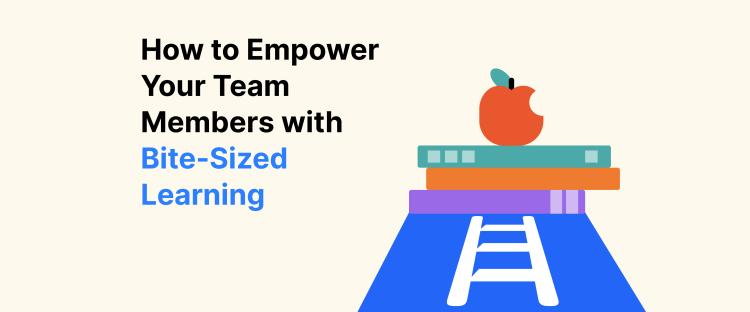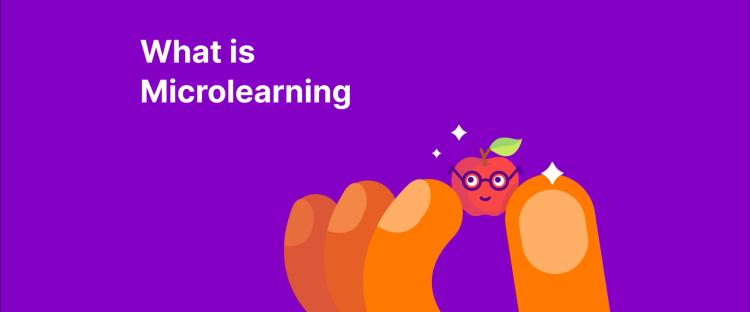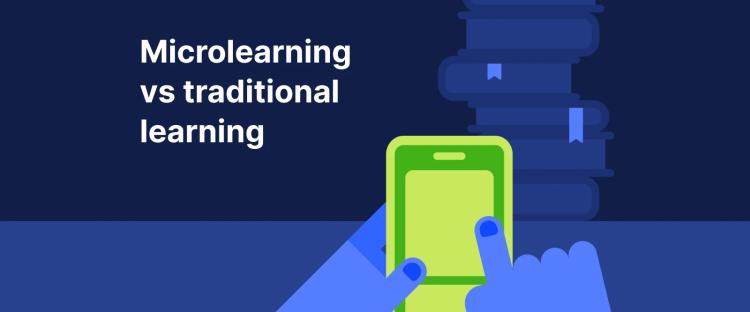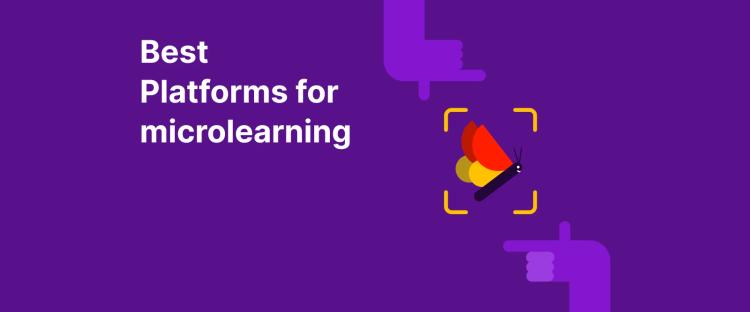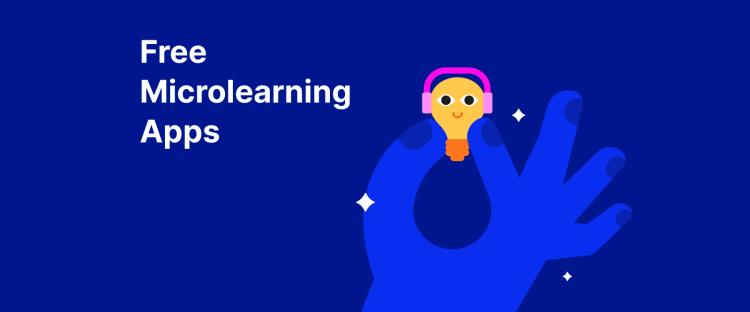Don't have time for a full-fledged training session? Want to choose something quick and effective — 5-10 minutes a day?
Or are you a trainer, HR specialist, or corporate training specialist and need to get a company policy change or new product information out to everyone in days, not weeks?
Microlearning is a growing education trend that is gaining traction among educators and educational technology innovators.
Today, microlearning programs utilize various tools, including flashcards, apps, games, videos, infographics, newsletters, podcasts, and text messages, to help with knowledge retention and upskilling. And now, a focused fragment of microlearning content can deliver short, concentrated pieces of training content that you can master in no more than 5–15 minutes.
We shouldn't view microlearning as simplistic or superficial. When used correctly, interactive learning promotes memorization, reflection, and application of knowledge in practice.
In this article, you'll learn about the ten best microlearning platforms:
Headway — Non-fiction book summaries
EdApp — Microlearning tools for employee course creation
eduMe — LMS for improving employee performance
TalentCards — Training materials as flashcards
Axonify — Microlearning for frontline workers
LearnUpon — LMS for corporate learning
7taps — Platform to train new hires
Qstream — Spaced repetition learning
Elevate — Short exercises for developing thinking
TalentLMS — Cloud platform for business learning
We all love spending time on our phones. With Headway, just 15 minutes a day can unlock amazing insights that truly resonate. The app offers quick nonfiction summaries, personal progress tracking, and a sleek design, placing it among the top bite-sized learning platforms ranked for busy professionals. Scroll smarter with Headway!
What is microlearning?
In recent years, e-learning has rapidly developed, changing how people acquire knowledge and skills. With tight work schedules and constant digital distractions, traditional long training programs often seem too complex and overwhelming.
Modern studies show that people's attention spans have dropped to 8 seconds over the last two decades. Under these conditions, traditional long lessons are no longer as practical.
Researchers have shown that people learn the material more effectively when it's broken into smaller sections. This phenomenon is known as "spaced repetition," and it shows that repeating information regularly enhances memory retention.
James Clear writes in 'Atomic Habits' that regular repetition is a valuable habit. He emphasizes that you build habits by repeating actions frequently, not by doing them for long periods.
Benefits of microlearning
There are platforms for both personal growth and staff training. So, whether you want to grow and use your time for development or work with employees, microlearning platforms can help you effectively train your colleagues.
Microlearning often uses interactive elements, such as tests, gamification, and multimedia materials, which make the learning experience more engaging and increase learner engagement.
User-friendly microlearning is based on short, small portions of information, which allows you to break down complex topics into accessible and easily digestible lessons.
A microlearning app is especially convenient when you want to learn something new on the way to work or during your workflow. It helps you use every free minute to the maximum benefit.
The main advantage of the microlearning experience is its flexibility. It can be a three-minute video on developing communication skills or quizzes that consolidate the knowledge gained.
"Success doesn't usually come from big leaps. It comes from small steps taken consistently." — 'Your Best Year Ever,' Michael Hyatt
Top 10 Microlearning Platforms for 2025
1. Headway
This is a platform for bite-sized learning with book summaries. Headway is a convenient app for daily upskilling. You can invest in your development by listening to audiobooks on business, leadership, personal growth, and psychology. Headway is a mobile-first app designed for microlearning in the rhythm of modern life.
![]()
Functionality:
Personalized learning, as the app generates personalized recommendations
Non-fiction book summaries in text or audio formats, lasting about 15 minutes
Interactive flashcards to help you remember key ideas from books
The Headway app provides daily notifications and tracks your progress
Possible cons: Lack of social learning (discussion or commenting between users)
Best suited for: Busy people who want to develop but don't have time to read whole books (young parents, managers, entrepreneurs who can only carve out 15 minutes daily). For those who want to improve their soft skills and thinking
Pricing: The free plan lets you read or listen to one daily book summary. Monthly — around $12.99/month. Quarterly — $29.99/3 months (≈$10/month). Yearly — $89.99/year (≈$7.50/month).
2. EdApp
It is a platform that includes tools for editing and creating training courses. When creating Micron, EdApp provides access to a library of 80+ interactive templates.
![]()
Functionality:
Gamification with focus tracking, badges, and certificates
Built-in authoring tool editor that allows you to create micro-lessons without coding or special design skills
EdApp integrates with other services (CRM, HR systems, API, SSO, SCORM, Webhuki) to automatically exchange data. When a new employee appears in the HR system, EdApp adds to the desired course.
It allows students to interact with each other in real time and discuss the topics together.
Possible cons: Complex editor interface
Best suited for: This app is suitable for companies that provide employee training and compliance training with mini-lessons. Trade, services, manufacturing, healthcare, and network businesses use it. Big companies like Coca-Cola, Shell, and Pandora have already used this app.
Pricing: The app offers free access to basic functions: $2.95 per monthly active user; the managed plan is $5.95 per monthly user, including content creation services, account support, and onboarding.
3. eduMe
It is an online learning platform for employee training. People can learn right in the workplace, getting short, interactive learning modules that are easy to complete from their mobile devices. The main goal is not just learning for the sake of information, but rather increasing workplace performance.
![]()
Functionality:
Social media style of mobile learning
Ability to link training to KPIs (increase sales conversion, reduce errors)
Employees can complete the modules at a convenient time, learning at their own pace
eduMe provides metrics of learner progress such as completion rate, test scores, time spent on each module, and progress over time
Possible cons: The platform is designed for medium and large businesses, often on an international scale. It's a cloud platform, so learning is only possible with internet access.
Best suited for: Hotel, restaurant, and catering workers, logistics companies
Pricing: No publicly available information, only upon the company's request.
4. TalentCards
It's a flashcard learning app ideal for transferring short knowledge: step-by-step instructions, procedures, rules, and checklists. TalentCards is a scalable platform, primarily if you aim to train massively and quickly.
![]()
Functionality:
An app that works both online and offline
Creating flashcards using AI
Supports text, images, videos, and tests
The leaderboard function is part of the platform's gamification
Possible cons: No complex course structure
Best suited for: New hires, service sector workers, manufacturing, security, trade
Pricing: The app is free for up to 5 users. For up to 50 users with limited features, the price is $49 per month. A premium plan with full analytics and customization is $79+ per month (up to 100 people).
5. Axonify
A platform for corporate training of frontline workers. AI-powered, the system learns from answers to improve knowledge retention.
![]()
Functionality:
The platform selects only relevant content for each specific employee
User-friendly interface with gamification, leaderboards, and awards
Includes ready-made content libraries for security, sales, and service
It supports realistic scenarios (scenario-based simulations), for example: "What would you do in this situation?")
Possible cons: High cost and a minimum number of users is usually 250+
Best suited for: Frontline workers and instructional designers who design, create, and improve instructional materials and learning experiences.
Pricing: The price is not available online; you need to contact the sales team of Axonify
6. LearnUpon
LearnUpon is an LMS platform that streamlines corporate learning by making it easy to manage, track, and scale training across teams.
![]()
Functionality:
Support for courses with tests, certifications, deadlines, and automatic reminders
Built-in reports on progress, success, and activity
Ability to create separate portals for internal employees, clients, and partners
Can automatically add webinars to training courses and track participation
Possible cons: It requires more time to configure than other similar platforms. The interface is less gamified than EdApp, for example.
Best suited for: Training employees in medium and large businesses
Pricing: Up to 100 users, LearnUpon costs from $700 per month. For up to 500 users, the price is approximately $1500 per month.
7. 7taps
7taps is a no-code platform for creating ultra-short training mini-courses. 7taps is a new generation of microlearning: fast, visual, and mobile-friendly.
![]()
Functionality:
The training format is mobile "stories" or "slides" similar to Instagram Stories.
Training takes only 2–3 minutes
Platform without a standalone app — opens via a link; you can send the course via Slack, email, or SMS
Quick facts for sellers about the product
Possible cons: Not suitable for mandatory certification or in-depth academic programs.
Best suited for: HR and managers who are not instructional designers
Pricing: The price depends on the number of authors and integrations. The free plan allows up to 3 courses; the Pro plan is $99 per month; the Enterprise plan with advanced analytics and customization is calculated upon request.
8. Qstream
Qstream is a platform specializing in deepening knowledge through microlearning and spaced repetition. This tool is well-suited for repeating learned knowledge.
![]()
Functionality:
Based on evidence-based science about memory and learning
Users get short questions (1–2 minutes) several times a week
After each answer, the user sees a short explanation
Real-time analytics identify knowledge gaps
Possible cons: Focuses only on repetition; not suitable for creating large courses
Best suited for: Sales teams and health care professionals
Pricing: Price depends on the number of users (from ~100+); the app works on an enterprise model.
9. Elevate
Elevate is a mobile app for developing cognitive skills (thinking, memory, focus, processing speed, speech) through quick games focusing on vocabulary, math, and processing speed.
![]()
Functionality:
The app gives you a quick test to determine your current cognitive abilities
The system creates a personal plan based on your needs and knowledge level
Elevate has a gamification system that encourages users to continue using the app every day
Has assessment functionality
Possible cons: Gamified format can increase screen time
Best suited for: Students and anyone who wants to develop speaking, critical thinking, and focus
Pricing: Free version with limited access to exercises, or full version for $12 per month.
10. TalentLMS
TalentLMS is an easy-to-use learning management system for experienced and novice trainers. The system allows you to create microlearning courses for corporate online training quickly.
![]()
Functionality:
Clear interface, without unnecessary elements and complex functions
The ability to use your own content, such as presentations and documents, as well as upload content from other sources, such as YouTube and SlideShare
The platform is also compatible with SCORM and TinCan standards, which provides flexibility in using various content formats
You can customize the rules for receiving rewards
Possible cons: Some integrations require additional fees and simple course design
Best suited for: Training of sellers, partnerships, online schools, and education projects
Pricing: Free for up to 5 users, $89 per month for up to 40 users, $189 per month for up to 100 users, and $369 per month for up to 500 users. Plans for large companies are selected individually.
Microlearning apps
So, what's the difference between a microlearning app and a microlearning platform?
A microlearning app is:
A mobile app created for an individual user (Headway, Duolingo, Elevate).
A microlearning platform is:
A comprehensive solution for training in organizations or teams that offers analytics, content management, and role personalization. The platform runs in a browser and often has a mobile app. The goal is to provide systematic staff training (Axonify, EdApp, 7taps).
So, do you want to study independently for 10 minutes a day? Select an app that makes learning easy — lots of free microlearning apps are out there!.
Do you want to train a team systematically and effectively? You need a platform.
How to choose the right microlearning platform
Use the table below to compare and choose the microlearning platform that best suits your needs.
| Microlearning platforms | Content type | Learner demographics | Integration capabilities |
|---|---|---|---|
Headway | Book summaries, audio lessons, and daily insights | Individual users, self-learners | Minimal, no integrations |
Edapp | Micro-courses, quizzes, SCORM, video, and AI content | Corporate users, retail, and manufacturing | SCORM, xAPI, SSO, API, Zoom, MS Teams, Slack |
EduMe | Bite-sized lessons, videos, quizzes, and mobile-first units | Frontline teams, gig workers, and the distributed workforce | SCORM, SSO, Zapier, Salesforce, API |
Talent cards | Card-based lessons, micro-quizzes, images, and PDFs | Officeless workers, mobile teams | API, SSO, basic integrations |
Axonify | Adaptive microlearning, gamified quizzes, and simulations | Frontline staff (retail, logistics, safety) | API, SSO, LMS, workforce platforms (Workday, ADP) |
LearnUpon | Full eLearning courses, quizzes, webinars | Corporate employees, clients, and partners | SCORM, xAPI, SSO, Salesforce, webinar tools |
7taps | Mobile micro-stories, GIFs, short videos, text cards | Onboarding, sales enablement, and rapid learning | Without deep integrations |
Qstream | Quiz-style questions, spaced repetition, micro-scenarios | Sales, pharma, healthcare, and compliance teams | Salesforce, LMS, API, MS Teams, Slack |
Elevate | Cognitive games, reading/math/speaking exercises | Individual users (B2C), skills development | No professional integrations |
TalentLMS | Full LMS content, quizzes, videos, certifications | SMB, L&D teams, and external partners | SCORM, xAPI, SSO, API, Zoom, Slack, HRIS |
How platforms use AI to tailor learning paths
AI can create personalized, interactive content for learners, helping to keep them engaged. It provides an innovative way to teach lessons, assign tasks (for example, Axonify and EdApp), and introduce new concepts or topics. Another benefit of integrating AI into microlearning is the personalized learning path it can provide.
Not all students learn similarly; some may need visual aids, while others may find textual explanations easier to understand. AI can identify areas where a student is struggling and provide additional support, making learning more effective and enjoyable.
For example, Qstream uses AI-driven spaced repetition for areas of knowledge that need more attention. Headway generates book summaries based on your preferences using AI.
See what makes Headway a game-changer for microlearning
Still wondering what app to use to learn faster on the go? Try Headway with its extensive library of nonfiction book summaries!
Headway is a useful platform both for individuals and entire companies. The best authors write books based on their professional experience in psychology, relationships, business, leadership, and self-improvement.
In a short amount of time, you'll gain the knowledge equivalent to that of an entire book. This format provides value, especially for those who may not have the time to read it fully.
There are no "learning modules," deadlines, or exams. Headway encourages the habit of learning gently, without any pressure.
You can easily start today with just a few minutes each day. Choose the topic you want to grow, and you won't have to worry about where to begin. The Headway app will provide you with the best book summaries.
FAQs
How long should a microlearning module be?
Microlearning modules could be 2–7 minutes. The topic cannot be too extensive or broken into fragments. The format can be mini-lectures or workshops lasting up to 30 minutes.
Is microlearning the same as mobile learning?
Microlearning and mobile learning are not the same, although they are often used together. Mobile learning is learning through mobile devices, regardless of the volume or duration of the lesson.
When is microlearning not suitable?
Microlearning is not suitable if you need to explain a multistep concept. You can break it down into separate blocks, but this will take a lot of time and effort, unlike when you explain a single topic. It's also not suitable if the subject requires in-depth study.
Is assessment necessary in microlearning?
Assessment is not a mandatory part of microlearning, but it allows you to collect valuable learning data, such as course completion rates, test scores, and engagement rates. This data can help you understand what's working and where learners may need additional support if you use it to train others or track your progress.
How is microlearning used in corporate training?
The flexibility of microlearning allows you to combine different types of content to maintain interest in the learning process. Videos, infographics, instructions, demos, podcasts, and tests are all equally effective for short lessons. Use interactivity to engage colleagues more. Microlearning in corporate training also includes onboarding, getting to know the company, and learning about a new product or product range.
Which microlearning app is best for productivity skills?
Headway stands out as a top microlearning app for productivity skills, offering 15-minute book summaries from bestselling nonfiction titles focused on time management, efficiency, and personal development. The app delivers actionable insights from expert authors in bite-sized formats, making it easy to build productivity habits during commutes, breaks, or whenever you have spare moments throughout your day.
Which microlearning platforms with streaks and reminders can help me stay motivated?
Platforms with short lessons and streaks help maintain a steady pace. Headway gives you daily self-development insights, Duolingo motivates you with gamification, and Brilliant keeps you focused on math through reminders. Coursera Daily also works because it sends you small tasks to complete. These regular prompts build a habit and keep you from giving up.







